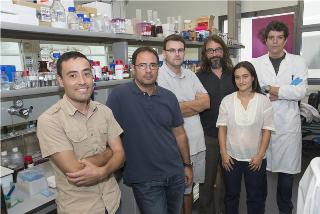Oct 25 2014
Researchers of the Catalan Institute of Nanoscience and Nanotechnology (ICN2), a Severo Ochoa Centre of Excellence, and the Universitat Autònoma de Barcelona (UAB) have developed the new BiogàsPlus, a technology which allows increasing the production of biogas by 200% with a controlled introduction of iron oxide nanoparticles to the process of organic waste treatment.
 The researchers behind BiogàsPlus, from left to right: Eudald Casals, Xavier Font, Antoni Sánchez, Víctor Puntes, Raquel Barrena and Martí Busquets. Photo:UAB
The researchers behind BiogàsPlus, from left to right: Eudald Casals, Xavier Font, Antoni Sánchez, Víctor Puntes, Raquel Barrena and Martí Busquets. Photo:UAB
The development of BiogàsPlus was carried out by the ICN2's Inorganic Nanoparticle group, led by ICREA researcher Víctor Puntes, and by the Group of Organic Solid Waste Composting of the UAB School of Engineering, directed by Antoni Sánchez.
The system is based on the use of iron oxide nanoparticles as an additive which "feeds" the bacteria in charge of breaking down organic matter. This additive substantially increases the production of biogas and at the same time transforms the iron nanoparticles into innocuous salt.
“We believe we are offering a totally innovative approach to the improvement of biogas production and organic waste treatment, since this is the first nanoparticle application developed with this in mind. In addition, it offers a significant improvement in the decomposition of organic waste when compared to existing technologies”, explains Antoni Sánchez.
According to researchers, today's biogas production is not very efficient - only 30 to 40 per cent of organic matter is converted into biogas - when compared to other energy sources. “The first tests conducted with BiogàsPlus demonstrated that product increases up to 200% the production of this combustible gas. This translates into a profitable and sustainable solution to the processing of organic waste, thus favouring the use of this renewable source of energy”, affirms Eudald Casals, ICN2 researcher participating in the project.
At the moment, BiogàsPlus has been successfully applied in cellulose and mud found in urban treatment plants, but it also can be used in different anaerobic digestions, such as agricultural, industrial or urban waste treatments.
“Now the challenge lies in extrapolating the technology to digesters with capacity for hundreds of cubic metres. This would allow using it in large-scale anaerobic digestion processes around the world, thereby greatly increasing the production of biogas, a renewable energy which is growing steadily and is accessible to everyone”, Antoni Sánchez explains.
Applied Nanoparticles, a Gateway to the Market
“Our idea is the result of many projects: you study one thing and discover another”, Casals explains. “We were studying the toxicity of iron oxide nanoparticles in the waste treatment of anaerobic biological processes when we discovered that not only were they not toxic, they actually stimulated the production of biogas”, he adds.
Researchers saw this discovery as the opportunity to begin a business project and make its application possible. With that in mind, they created Applied Nanoparticles, gestated at the ICN2 and currently in the process of signing a knowledge transfer agreement with the UAB.
“Our business concept focuses on the design of processes with low energy, low toxicity, minimisation of waste and reduction of contaminating emissions”, Víctor Puntes affirms. “In addition, the composition of the additive can be optimised according to the waste which must be treated, in order to offer a maximum efficiency to the process.”